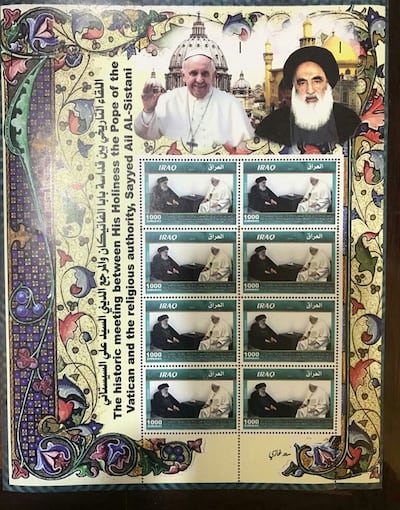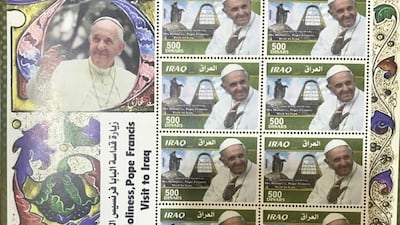Iraq has issued commemorative stamps marking the first papal visit to the country.
On March 5, Pope Francis began a three-day visit to Iraq, where he met senior government officials as well as community leaders from different religions and held prayers and Masses.
One of the stamps announced on Monday by the Iraqi Ministry of Communication, which runs the postal service, shows the smiling Pope raising his right hand, with a map of Iraq in the background.
Another stamp marks his meeting with Ayatollah Ali Al Sistani, the Shiite leader who wields considerable influence in Iraq and beyond. Two white doves, a shrine and Saint Peter's Basilica are featured as a symbol of coexistence.
Other stamps commemorate his stops at Our Lady of Salvation Church in Baghdad, the scene of an attack by Al Qaeda in Iraq in 2010 that killed at least 58 people during a Sunday Mass, and the ancient city of Ur, where he held a historic inter-religious meeting.
Only 5,000 stamps will be published, to be used locally and internationally.
Iraq's postal service is government-owned. The service is not used widely among Iraqis, especially after the 2003 US-led invasion that toppled Saddam Hussein. Most people prefer methods such as private couriers.

During his visit, the 84-year-old pontiff described himself as a “pilgrim of peace” and called on Iraqis to ensure they had "one prayer, one mind, one hope to achieve unity and peace". He also called for an end to violence in Iraq.
Christians in Iraq trace their roots back to the beginning of the faith. But after the US-led invasion that toppled dictator Saddam Hussein in 2003 and the rise of violence that resulted in civil war, the size of the community has decreased tremendously.
An estimated million Christians have left Iraq in the past decade.
It is difficult to know the exact number of Christians still living in the country after years of war and conflict in which many were either killed or had to flee to other countries. But community leaders estimate that about 500,000 Christians remain
Iraq has 14 recognised Christian sects, but two decades of back-to-back conflicts left ancient Christian communities that were once a vibrant and integral part of the landscape scattered and in ruins.



